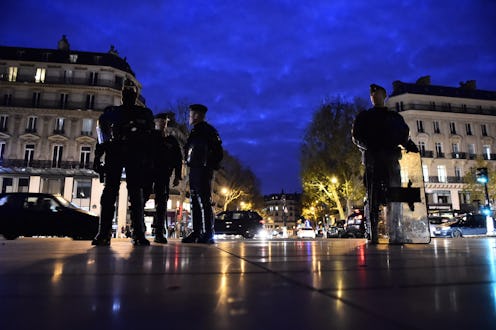News
The Latest On The Paris Attacks
It's been just over a week since members of ISIS wreaked havoc on Paris, killing 130 people and injuring hundreds more around the city. The attacks, which primarily occurred at the Bataclan music venue and the Stade de France soccer stadium, were the most lethal to occur in the country since World War II. A massive police raid in the Paris suburb of Saint-Denis, where the Stade de France is located, followed on Wednesday. Alleged attack mastermind Abdelhamid Abaaoud was killed in the raid. By Friday, citizens were mourning the week anniversary of the tragedies that unfolded around the city. The latest on the Paris attacks shows a country still racked with grief and fear.
That uneasiness has spread to Belgium, where authorities are currently searching for more suspects tied to the Paris attacks; the neighboring country is currently on its highest alert. French President Francois Hollande will embark on a multi-country tour starting on Monday to meet with British Prime Minister David Cameron, German Chancellor Angela Merkel, Russian President Vladimir Putin, and President Obama. The meetings are in hopes that Hollande can further unify with other world powers in their fight against ISIS. Authorities continue to investigate what unfolded in Paris as they seek information about suspects and the events that unfolded.
The Third Suspect
French National Police released a photo of the man they believe is the third Stade de France attack suspect. The unidentified suspect and two others blew themselves up during a soccer match between France and Germany the evening of Friday, Nov. 13, killing one other person as well as themselves and injuring even more. Authorities are seeking any additional information about the suspect and are encouraging anyone who may be able to identify the suspect to dial France's kidnapping and attack alert hotline 197.
Security Threats In Belgium
Tension continues to mount in nearby Belgium, where the national threat level is at its highest, indicating a "serious and immediate" threat. The threat level has been extended into Monday and has prompted the closure of schools and public transit around the country. Museums, shopping centers, and many major public places that could draw a crowd have been closed. Likewise, venues and clubs have canceled events in light of recent security threats. The city of Brussels has suspended its Christmas market in addition to canceling New Year's Eve fireworks.
Authorities are currently searching for the last suspect who is still alive, Salah Abdeslam, whose last known address was in Brussels. According to friends of Abdeslam, he is currently hiding in the country but seeking an escape to Syria. Abdeslam's brother Mohamed was interviewed by Belgian network RTBF, and urged his brother to turn himself in, saying that he and his family "would rather see Salah in prison than in a cemetery."
David Cameron's Seven Point Plan
British Prime Minister David Cameron is set to reveal a seven point strategy detailing his plans to combat ISIS. Cameron is also seeking the approval of the Parliament to allow airstrikes in Syria. It's unclear when, exactly, Cameron will unveil his plan this week, though he is scheduled to meet with French President Francois Hollande. Pressure from Russia may further complicate Cameron's defensive plans, however. According to a Russian foreign ministry spokesman, who discussed Cameron's "blueprint for war" with the Daily Mail, Russian authorities are determined to make the U.K. to coordinate their efforts so as not to destroy "the statehood of Syria."
French Defense Minister Jean-Yves Le Drian has echoed Cameron's statements for an increased aerial offensive in Syria, stating that they "must destroy Islamic State on its own territory. That's the only possible direction." In Kuala Lumpur, Malaysia, President Obama issued similarly impassioned statements, vowing that the U.S. would work together with other countries in a united front against ISIS.
What France Is Like Today
Memorials remain in place throughout Paris, with many continuing to pay their respect to the victims of last Friday's attacks. Nevertheless, public gatherings have been banned in France and citizens appear to be on high alert as hundreds of random searches have been carried out in an effort to better protect the country. A particular incident at the city's Gare du Nord train station illustrates the ongoing trepidation many citizens have of being out in public. A pigeon that was electrocuted on the train tracks sent passengers running, many of whom interpreted the noise to be an explosion of some kind.
Meanwhile, the victims' families have begun burying their dead. At the funeral of Estelle Rouat, who died at the Bataclan, relatives vowed to remain positive in spite of the attacks. "Seeing so many people proves that life goes on and that we must fight; we cannot let cruelty win," said an uncle of Rouat's. "We must continue to live, to go out, to listen to music."
